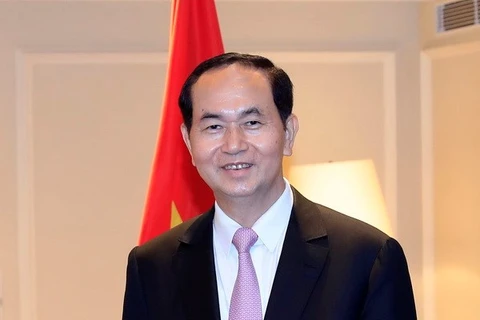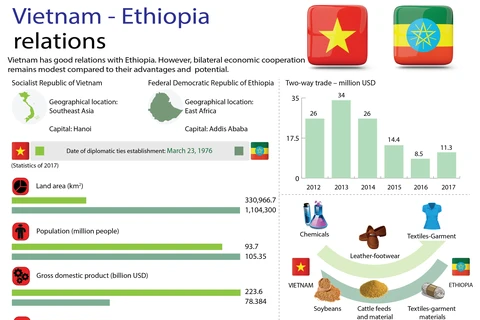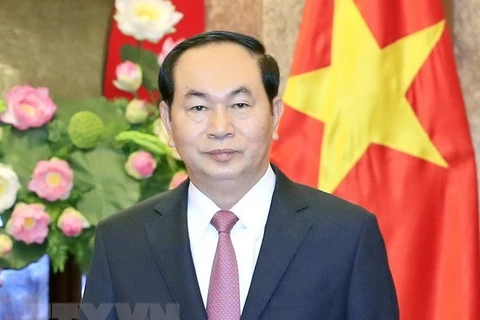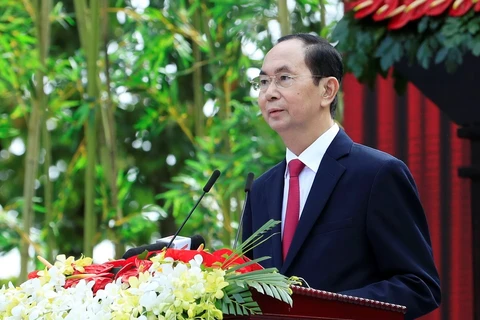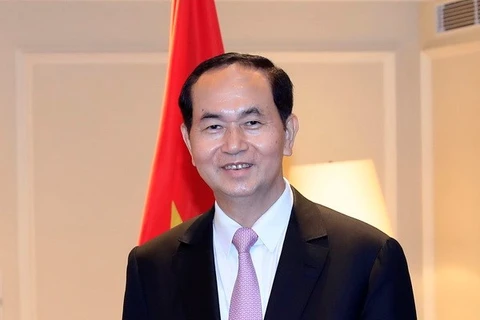Hanoi (VNA) - President Tran Dai Quang’s visit to Ethiopia and Egypt from August 23-29 is expected to open new prospects for trade and investment cooperation between Vietnam and the two nations, as well as with the African region in general.
Trade experts have said that Ethiopia, emerging from its prolonged drought period and high poverty rate, has become an “African tiger” with an annual economic growth of over 10 percent during the last decade.
Ethiopia is one of the oldest kingdoms in Africa, with agriculture dominating the national economy.
Notably, since the establishment of diplomatic relations in 1976, trade between Vietnam and Ethiopia has grown continuously, hitting 11.3 million USD in 2017. Vietnam exported 2.2 million USD worth of goods to Ethiopia, mainly in textiles, leather and footwear, and chemical products.
A representative of the Asia-Africa Market Department under the Ministry of Industry and Trade (MoIT), said that the visit to Ethiopia by President Tran Dai Quang is important to both diplomatic and economic ties between the two nations.
The visit will create a common framework for cooperation between the two countries, thus building a credible basis for the two sides to continue supporting each other, underlined the representative, adding that it will help Vietnam widen its export-oriented markets, while also helping Ethiopia have more development partners, attract investment, and create more jobs for its people.
With an area three times that of Vietnam and a population of over 100 million, Ethiopia is abundant with natural resources and its large labour force, but it is still inexperienced in management and lacks capital.
Vietnam can fully share its experience with Ethiopia, helping the country exploit more efficiently its available natural resources to achieve its goal of becoming a middle income country by 2025.
On the other hand, Vietnam will have a large market for its products, such as farm produce, processed food, footwear, garments, seafood, electronics and electrical equipment, construction materials, rubber and wood, and mechanical products.
In recent times, Vietnamese enterprises have started to implement a number of investment projects in Africa. The Viettel Military Industry and Telecoms Group has already successfully implemented projects in Mozambique, Tanzania, Cameroon, and Burundi, and the firm is now showing interest in investing in Ethiopia.
However, the department said due to geographic conditions, Vietnam and Ethiopia need to set up appropriate payment mechanisms to ensure security of trading activities.
They should also accelerate negotiations to sign necessary agreements, thus creating a legal basis for investment and business cooperation between their business communities.
Meanwhile, Egypt is the fifth largest trade partner of Vietnam in Africa. With sound relations and continuous development, bilateral trade between Vietnam and Egypt reached 350 million USD in 2017. Vietnam’s main exports to the country included seafood, auto spare parts, fabrics, black pepper, coffee, rubber, consumer goods, and steel.
In the first seven months of 2018, Vietnam’s export turnover to Egypt was valued at 277 million USD, representing a year-on-year increase of 45.2 percent.
Deputy Minister of MoIT Cao Quoc Hung said Egypt is not only a potential market but also a gateway for Vietnamese exports to enter Africa, the Middle East, and Europe.
Vietnam and Egypt are reliable partners, sharing mutual understanding, especially in their struggles for national liberation. The relationship was further strengthened when Egypt became the first Arabian country to establish diplomatic relations with Vietnam, opening up a new development step and creating favourable conditions for the two sides to enhance multifaceted cooperation.
Although the two countries signed many cooperation agreements on economy, trade, and investment, their bilateral trade is still not on a par with their mutual potential and strengths.
In order to further push bilateral trade and industry cooperation, Vietnam and Egypt should establish a periodic review and information exchange mechanism, diversify their exports and devise measures to fully exploit the two economies’ strength and potential.
The two sides will limit the application of technical barriers to facilitate bilateral trade, promoting collaboration in the spheres of oil and gas, footwear, processing food, and renewable energy.
According to Do Quoc Hung, Deputy Director of the Asia-Africa Market Department, Africa is an very important economic partner of Vietnam, especially in terms of the latter’s exports of rice, coffee, pepper, and coconut.
Major export markets for Vietnamese farm produce are Algeria, Morocco, Nigeria, South Africa, Egypt, Côte d'Ivoire, and Ghana.
In the context of Vietnam’s traditional export markets gradually reaching saturation, the promotion of potential export markets – such as Ethiopia and Egypt in particular, as well as Africa in general is a new direction for Vietnamese businesses for the time to come.–VNA
VNA

